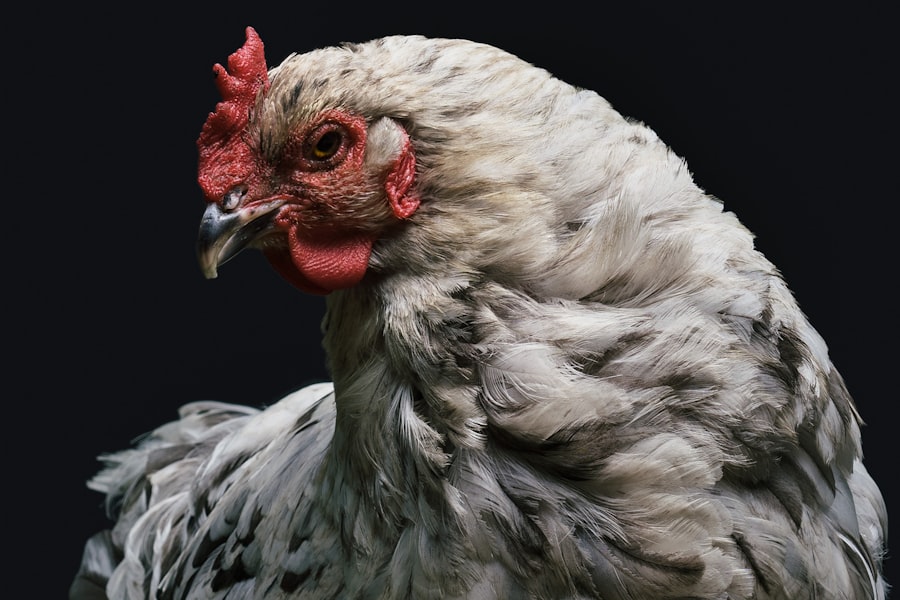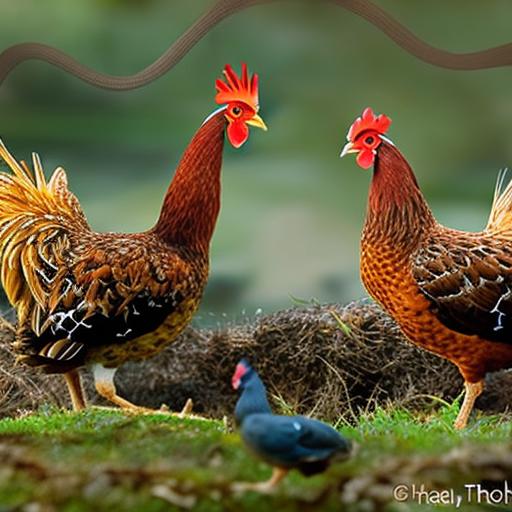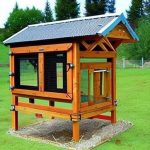Snake control in chicken coops is a crucial aspect of keeping chickens safe and healthy. Snakes can pose a significant threat to chickens, as they are natural predators and can easily prey on them. Therefore, it is essential for chicken owners to take measures to prevent snakes from entering their coops. In this article, we will explore the importance of snake control, provide information about snakes and common species found in chicken coops, discuss how snakes can enter the coop, and offer tips on preventing snakes from entering the coop.
Key Takeaways
- Snake control is important for the safety of chickens and their owners.
- Understanding snakes and their behavior can help prevent them from entering the chicken coop.
- Identifying and sealing entry points in the chicken coop is crucial in preventing snake intrusion.
- Using snake repellents and keeping the coop clean can also deter snakes from entering.
- Encouraging natural predators of snakes and educating yourself on snake safety can further protect your chickens.
The Importance of Snake Control
Snake control is vital for chicken owners because snakes can cause harm to chickens and disrupt their overall well-being. Snakes are natural predators and have the ability to kill and consume chickens. This not only results in the loss of valuable livestock but also creates stress and fear among the remaining chickens. Additionally, snakes can introduce diseases and parasites into the coop, further compromising the health of the flock.
Furthermore, the presence of snakes in the chicken coop can lead to a decrease in egg production. Chickens may become stressed and anxious when they sense the presence of a predator, which can disrupt their normal laying patterns. This can be detrimental for chicken owners who rely on a steady supply of eggs.
Understanding Snakes
To effectively control snakes in chicken coops, it is important to have a basic understanding of these reptiles. Snakes are elongated, legless reptiles that belong to the suborder Serpentes. They are cold-blooded creatures that rely on external sources of heat to regulate their body temperature. Snakes have a wide range of sizes, colors, and patterns, making them diverse and adaptable creatures.
In chicken coops, several snake species are commonly encountered. The most common species include rat snakes, garter snakes, and black racers. Rat snakes are non-venomous constrictors that primarily feed on rodents, but they can also prey on chickens. Garter snakes are small to medium-sized snakes that are harmless to humans and chickens. Black racers are fast-moving snakes that are known for their aggressive behavior when threatened.
Identifying Snake Entry Points in the Chicken Coop
Snakes can enter chicken coops through various entry points, so it is important to identify and secure these areas. Snakes are excellent climbers and can easily scale walls and fences. They can also squeeze through small openings, such as gaps in doors, windows, or ventilation systems. Additionally, snakes can burrow under the coop or enter through gaps in the flooring.
To identify potential snake entry points, thoroughly inspect the coop and surrounding area. Look for any gaps or holes in the walls, windows, doors, and flooring. Seal these openings with hardware cloth or other materials that snakes cannot penetrate. Pay attention to areas where pipes or wires enter the coop, as these can also serve as entry points for snakes.
Preventing Snakes from Entering the Chicken Coop
There are several methods that can be employed to prevent snakes from entering the chicken coop. One effective method is to install a hardware cloth barrier around the coop. This barrier should be buried at least six inches into the ground to prevent snakes from burrowing underneath it. Additionally, ensure that the hardware cloth extends at least two feet above ground level to prevent snakes from climbing over it.
Another method is to install snake-proof fencing around the perimeter of the coop and surrounding area. This fencing should be made of a material that snakes cannot penetrate, such as galvanized steel mesh or solid wood panels. The fencing should be at least three feet high and extend at least six inches into the ground to prevent snakes from burrowing underneath it.
Using Snake Repellents in the Chicken Coop

Snake repellents can be used as an additional measure to deter snakes from entering the chicken coop. There are various types of snake repellents available, including chemical repellents and natural repellents. Chemical repellents typically contain ingredients that emit strong odors or tastes that snakes find unpleasant. Natural repellents, on the other hand, rely on natural substances, such as essential oils or plant extracts, to repel snakes.
When using snake repellents, it is important to follow the instructions provided by the manufacturer. Apply the repellent in areas where snakes are likely to enter or hide, such as around the perimeter of the coop or near potential entry points. Reapply the repellent regularly, especially after rain or heavy watering, as these can wash away the repellent.
Keeping the Chicken Coop Clean and Tidy
Maintaining a clean and tidy chicken coop can help prevent snakes from taking up residence. Snakes are attracted to areas with abundant food sources, such as rodents and insects. By keeping the coop clean and free of debris, you can reduce the likelihood of attracting these prey animals and, in turn, deter snakes from entering.
Regularly remove any spilled feed or food scraps from the coop. Store chicken feed in secure containers that cannot be accessed by rodents or other pests. Keep the coop free of clutter and debris, as these can provide hiding places for snakes. Additionally, regularly clean and disinfect the coop to prevent the buildup of odors that may attract snakes.
Encouraging Natural Predators of Snakes
One natural and effective way to control snakes in chicken coops is to encourage natural predators of snakes to visit your property. Some common predators of snakes include hawks, owls, raccoons, and certain species of snakes themselves. By creating a habitat that is attractive to these predators, you can help keep snake populations in check.
To attract birds of prey, install perches or nesting boxes in and around your property. These structures provide suitable roosting and nesting sites for hawks and owls. Additionally, create a diverse and natural landscape that provides habitat for snakes’ natural predators, such as raccoons. This can include planting native vegetation, providing water sources, and creating brush piles or rock piles.
Educating Yourself and Your Family on Snake Safety
While it is important to control snakes in chicken coops, it is equally important to educate yourself and your family on snake safety. Snakes play a vital role in ecosystems and are generally not aggressive towards humans unless threatened. Therefore, it is important to learn how to identify venomous snakes in your area and understand their behavior.
Teach children to respect snakes and avoid approaching or handling them. Encourage them to observe snakes from a safe distance and appreciate their role in nature. If you encounter a snake in your chicken coop or on your property, it is best to contact a professional snake removal service to safely remove the snake.
Keeping Your Chickens Safe from Snakes
In conclusion, snake control in chicken coops is essential for the safety and well-being of chickens. Snakes can pose a significant threat to chickens, as they are natural predators and can easily prey on them. By understanding snakes, identifying potential entry points, preventing snakes from entering the coop, using repellents, keeping the coop clean and tidy, encouraging natural predators of snakes, and educating yourself and your family on snake safety, you can effectively control snakes in your chicken coop and keep your chickens safe.
If you’re keeping chickens and want to avoid snakes, it’s important to choose the right location for your chicken coop. A helpful article on Poultry Wizard provides guidance on where to put your chicken coop to minimize the risk of snakes. By placing the coop in a strategic location, you can create a safer environment for your chickens. Check out the article here for more information on how to keep snakes away from your chickens.
FAQs
What are the dangers of snakes when keeping chickens?
Snakes can pose a threat to chickens by preying on them or their eggs. Some snakes are venomous and can also be a danger to humans.
What are some ways to prevent snakes from entering the chicken coop?
To prevent snakes from entering the chicken coop, it is important to keep the area clean and free of debris. Seal any holes or gaps in the coop and use hardware cloth to cover windows and vents. Keep the grass and vegetation around the coop trimmed and remove any potential hiding spots for snakes.
What should I do if I find a snake in the chicken coop?
If you find a snake in the chicken coop, it is important to remove it as soon as possible. Use a snake hook or other tool to safely remove the snake and release it far away from the coop. If the snake is venomous or you are unsure how to safely remove it, contact a professional.
Are there any natural snake repellents that can be used?
There are some natural snake repellents that can be used, such as mothballs, cinnamon, and clove oil. However, it is important to note that these methods may not be effective and can also be harmful to chickens and other animals.
What are some signs that a snake may be present in the chicken coop?
Some signs that a snake may be present in the chicken coop include missing eggs or chickens, shed snake skin, and droppings that are larger than those of a chicken. It is important to regularly inspect the coop and surrounding area for any signs of snakes.
Meet Walter, the feathered-friend fanatic of Florida! Nestled in the sunshine state, Walter struts through life with his feathered companions, clucking his way to happiness. With a coop that’s fancier than a five-star hotel, he’s the Don Juan of the chicken world. When he’s not teaching his hens to do the cha-cha, you’ll find him in a heated debate with his prized rooster, Sir Clucks-a-Lot. Walter’s poultry passion is no yolk; he’s the sunny-side-up guy you never knew you needed in your flock of friends!







